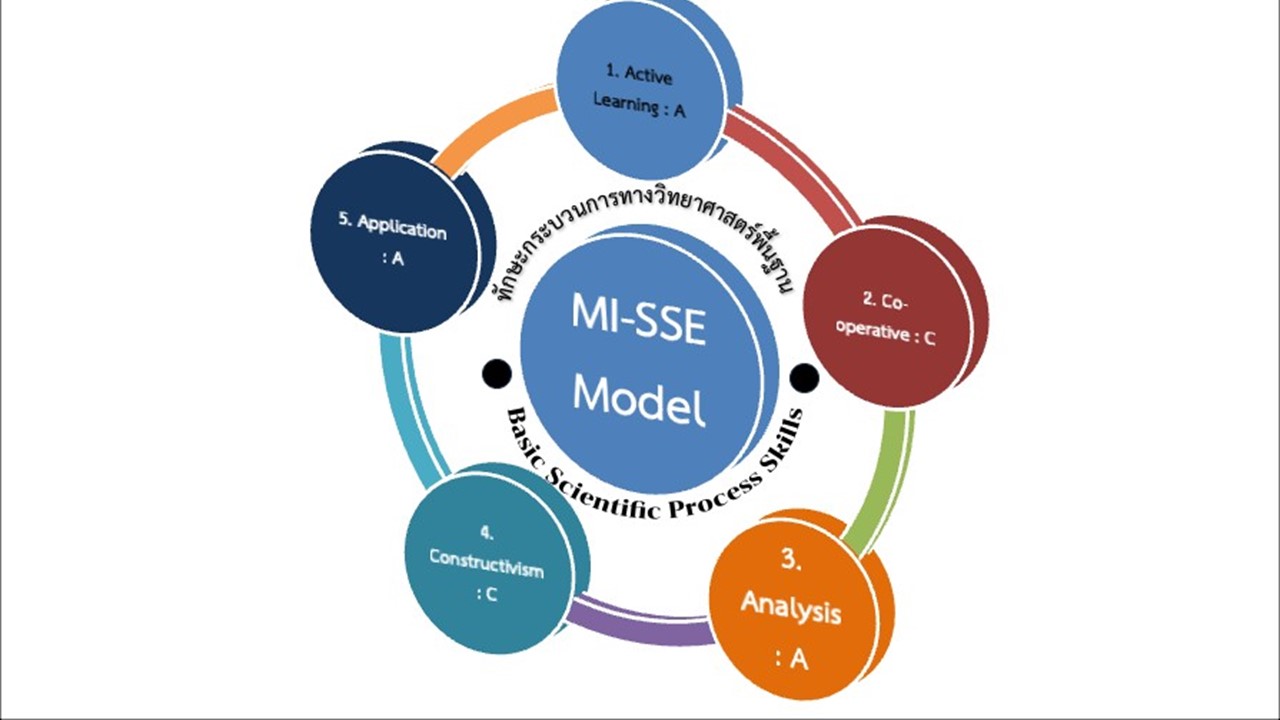การพัฒนารูปแบบการจัดประสบการณ์ตามแนวคิดพหุปัญญาร่วมกับแบบฝึกทักษะวิทยาศาสตร์เพื่อเสริมสร้างทักษะกระบวนการทางวิทยาศาสตร์พื้นฐาน สำหรับนักเรียนชั้นอนุบาลปีที่ 2 โรงเรียนเทศบาลบ้านตูม
Main Article Content
บทคัดย่อ
การวิจัยและพัฒนาครั้งนี้มีวัตถุประสงค์เพื่อ (1) ศึกษาวิเคราะห์ข้อมูลพื้นฐาน และความต้องการในการพัฒนารูปแบบการจัดประสบการณ์เพื่อเสริมสร้างทักษะกระบวนการทางวิทยาศาสตร์พื้นฐาน (2) ออกแบบและการพัฒนารูปแบบการจัดประสบการณ์ตามแนวคิดพหุปัญญาร่วมกับแบบฝึกทักษะวิทยาศาสตร์เพื่อเสริมสร้างทักษะกระบวนการทางวิทยาศาสตร์พื้นฐาน ให้มีประสิทธิภาพตามเกณฑ์ 80/80 (3) ทดลองใช้รูปแบบการจัดประสบการณ์ตามแนวคิดพหุปัญญาร่วมกับแบบฝึกทักษะวิทยาศาสตร์เพื่อเสริมสร้างทักษะกระบวนการทางวิทยาศาสตร์พื้นฐาน และ(4) ประเมินผลรูปแบบการจัดประสบการณ์ตามแนวคิดพหุปัญญาร่วมกับแบบฝึกทักษะวิทยาศาสตร์เพื่อเสริมสร้างทักษะกระบวนการทางวิทยาศาสตร์พื้นฐาน กลุ่มเป้าหมาย คือ นักเรียนชั้นอนุบาลปีที่ 2 (4-5 ปี) จำนวน 13 คน ภาคเรียนที่ 2 ปีการศึกษา 2565 เครื่องมือที่ใช้ในการวิจัย ได้แก่ แบบบันทึกการค้นหาปัญหาและหาสาเหตุของปัญหา, แบบวิเคราะห์ปัญหาวิจัย, แบบบันทึกแนวทางแก้ไขปัญหาและออกแบบกิจกรรม, คู่มือการใช้รูปแบบ, แผนการจัดประสบการณ์, แบบฝึกทักษะกระบวนการทางวิทยาศาสตร์พื้นฐาน และแบบประเมินทักษะกระบวนการทางวิทยาศาสตร์พื้นฐาน วิเคราะห์ข้อมูลเชิงคุณภาพด้วยการวิเคราะห์เนื้อหา และวิเคราะห์ข้อมูลเชิงปริมาณด้วยสติติพื้นฐาน ผลการวิจัย พบว่า (1) มีความต้องการจำเป็นเร่งด่วนในการพัฒนาทักษะกระบวนการทางวิทยาศาสตร์พื้นฐานของเด็กด้วยรูปแบบการจัดประสบการณ์ตามแนวคิดพหุปัญญาร่วมกับแบบฝึกทักษะวิทยาศาสตร์ (2) รูปแบบการจัดประสบการณ์ตามแนวคิดพหุปัญญาร่วมกับแบบฝึกทักษะวิทยาศาสตร์เพื่อเสริมสร้างทักษะกระบวนการทางวิทยาศาสตร์พื้นฐาน ประกอบด้วย หลักการ วัตถุประสงค์ ขั้นตอนการจัดการเรียนรู้ การวัดและประเมินผล และปัจจัยและเงื่อนไขการนำรูปแบบไปใช้ (3) ประสิทธิภาพของรูปแบบการจัดประสบการณ์ตามแนวคิดพหุปัญญาร่วมกับแบบฝึกทักษะวิทยาศาสตร์เพื่อเสริมสร้างทักษะกระบวนการทางวิทยาศาสตร์พื้นฐาน สำหรับนักเรียนชั้นอนุบาลปีที่ 2 พบว่า มีประสิทธิภาพเท่ากับ 85.56/85.52 ซึ่งสูงกว่าเกณฑ์ที่กำหนด และ(4) ผลการประเมินรูปแบบ พบว่า นักเรียนมีคะแนนเฉลี่ยทักษะกระบวนการทางวิทยาศาสตร์พื้นฐานเพิ่มขึ้น 4.30 คิดเป็นร้อยละ 47.78 และผ่านเกณฑ์ร้อยละ 92.31 สูงกว่าเป้าหมายที่กำหนดไว้
Article Details
เอกสารอ้างอิง
กชกร ธิปัตดี และมานิต ยอดเมือง. (2557). การออกแบบและผลิตวัสดุหลักสูตร. อุบลราชธานี : มหาวิทยาลัยราชภัฏอุบลราชธานี.
กฤษดา ยะแสง. (2564). ผลการจัดกิจกรรมดนตรีตามแนวคิดของ Orff และ Dalcroze ที่มีต่อความสามารถทางพหุปัญญาของเด็กปฐมวัย. วิทยานิพนธ์ครุศาสตรมหาบัณฑิต สาขาวิชาหลักสูตรและการสอน มหาวิทยาลัยราชภัฎนครราชสีมา.
เจนรักษ์ คำภูธร. (2561). ผลการเรียนรู้โดยใช้วัฎจักรการเรียนรู้ร่วมกันแบบฝึกทักษะกระบวนการทางวิทยาศาสตร์ขั้นพื้นฐาน เรื่อง วัสดุรอบตัวเรา กลุ่มสาระการเรียนรู้วิทยาศษสตร์ สำหรับประถมศึกษาปีที่ 3. วิทยานิพนธ์หลักสูตรครุศาสตรมหาบัณฑิต สาขาวิชาหลักสูตรและการเรียนการสอน. มหาวิทยาลัยราชภัฏมหาสารคาม.
ฉวีวรรณ กีรติกร. (2557). สื่อการสอนระดับประถมศึกษา. พิมพ์ครั้งที่ 8. นนทบุรี : โรงพิมพ์มหาวิทยาลัยสุโขทัยธรรมาธิราชม.
ชบาไพร รัตนกาญจน์. (2557). ผลการใช้แบบฝึกทักษะกระบวนการทางวิทยาศาสตร์ขั้นพื้นฐานสำหรับนักเรียนชั้นอนุบาลปีที่ 2. วิทยานิพนธ์ครุศาสตรมหาบัณฑิต สาขาวิชาหลักสูตรและการสอน มหาวิทยาลัยราชภัฏบุรีรัมย์.
ชัยยงค์ พรหมวงศ์. (2557). ชุดการเรียนการสอน. ในเอกสารประมวลสาระชุดวิชาการพัฒนาหลักสูตรและ สื่อการเรียนการสอน. พิมพ์ครั้งที่ 3. สาขาวิชาศึกษาศาสตร์ นนทบุรี: มหาวิทยาลัยสุโขทัยธรรมาธิราช.
ทวีศักดิ์ สิริรัตน์เรขา. (2565). ทฤษฎีพหุปัญญา. https://www.happyhomeclinic.com/a01-multiple-intelligence.htm
ทวีศักดิ์ สิริรัตน์เรขา. (2566). ทฤษฎีพหุปัญญา. https://www.happyhomeclinic.com/a01-multiple-intelligence.htm
เบญจมาศ อยู่เป็นแก้ว. การสอนแบบบูรณาการ. พิมพ์ครั้งที่ 3. กรุงเทพฯ : ภาพพิมพ์, 2559.
ประภา ศรีม่วงพงษ์. (2560). การพัฒนาแบบฝึกทักษะกระบวนการทางวิทยาศาสตร์พื้นฐาน เรื่อง ระบบอวัยวะในร่างกาย กลุ่มสาระการเรียนรู้วิทยาศาสตร์ สำหรับนักเรียนชั้นประถมศึกษาปีที่ 6. วิทยานิพนธ์หลักสูตรครุศาสตรมหาบัณฑิต สาขาวิชาหลักสูตรและการสอน มหาวิทยาลัยราชภัฎเทพสตรี.
มาเรียม นิลพันธุ์. (2555). วิธีวิจัยทางการศึกษา. พิมพ์ครั้งที่ 7. นครปฐม: ศูนย์วิจัยและพัฒนาการศึกษา คณะศึกษาศาสตร์ มหาวิทยาลัยศิลปากร.
เยาวพา เดชะคุปต์. (2557). การศึกษาปฐมวัย. กรุงเทพฯ : แม๊ค.
เยาวพา เดชะคุปต์. (2551). รายงานการวิจัยการพัฒนาพหุปัญญาเพื่อการเรียนรู้สำหรับการจัดการศึกษาในบริบทสังคมไทย. กรุงเทพฯ: สาขาการศึกษาปฐมวัย คณะศึกษาศาสตร์ มหาวิทยาลัยศรีนครินทรวิโรฒ.
ลัดดาวัลย์ นุชนารถ (2561). การศึกษาผลของการจัดศูนย์การเรียนรู้แบบเน้นกิจกรรมตามแนวพหุปัญญาที่มีต่อความสามารถด้านคณิตศาสตร์ และความสามารถด้านภาษาของเด็กปฐมวัย. วิทยานิพนธ์ครุศาสตรมหาบัณฑิต สาขาวิชาการจัดการการเรียนรู้ มหาวิทยาลัยราชภัฏพระนครศรีอยุธยา.
วารินทร์ บุตรวร. (2558). การเปรียบเทียบทักษะกระบวนการทางวิทยาศาสตร์ของนักเรียนชั้นอนุบาล ปีที่ 2 ระหว่างการจัดประสบการณ์ตามแนวพหุปัญญา และการจัดประสบการณ์ตามแนวจิตปัญญา. ปริญญานิพนธ์ครุศาสตรมหาบัณฑิต สาขาวิชาหลักสูตรและนวัตกรรมการจัดการเรียนรู้ มหาวิทยาลัยนครพนม.
วิมลรัตน์ สุนทรโรจน์. (2556). การพัฒนาการเรียนการสอนภาควิชาหลักสูตรและการสอน. มหาสารคาม : คณะศึกษาศาสตร์ มหาวิทยาลัยมหาสารคาม.
สถาบันส่งเสริมการสอนวิทยาศาสตร์และเทคโนโลยี. (2556). คู่มือการจัดการเรียนรู้กลุ่มสาระการเรียนรู้วิทยาศาสตร์. กรุงเทพฯ : โรงพิมพ์คุรุสภาลาดพร้าว.
สำนักงานคณะกรรมการการศึกษาขั้นพื้นฐาน. (2557). คู่มือหลักสูตรการศึกษาปฐมวัย. พิมพ์ครั้งที่ 2. กรุงเทพฯ : โรงพิมพ์คุรุสภาลาดพร้าว.
อดุลย์ ภูปลื้ม. การใช้แบบฝึกทักษะ. พิมพ์ครั้งที่ 5. กรุงเทพฯ : ไทยวัฒนาพานิช, 2559.
อรอนงค์ หมิกพิมล. (2563). การพัฒนาชุดกิจกรรมการจัดประสบการณ์ตามรูปแบบพหุปัญญาเพื่อการ เรียนรู้ โดยใช้นิทานเป็นสื่อ เพื่อส่งเสริมคุณธรรมจริยธรรม การอยู่ร่วมกันของเด็กปฐมวัย ศูนย์พัฒนาเด็กเล็กบ้านกะแดะแจะ จังหวัดสุราษฎร์ธานี. วิทยานิพนธ์นี้ปริญญาครุศาสตรมหาบัณฑิต สาขาวิชาหลักสูตรและการสอน มหาวิทยาลัยราชภัฏสุราษฎร์ธานี.
เอราวรรณ ศรีจักร. (2550). การพัฒนาทักษะกระบวนการวิทยาศาสตร์ของเด็กปฐมวัย โดยใช้กิจกรรมการเรียนรู้ประกอบชุดแบบฝึกทักษะ. ปริญญาหลักสูตรปริญญาการศึกษามหาบัณฑิต สาขาวิชาการศึกษาปฐมวัย มหาวิทยาลัยศรีนครินทรวิโรฒ.
Armstrong, T. (2023). Multiple intelligences. https://www.institute4learning.com/ resources/articles/multiple-intelligences/
Cherry, K. (2023). Gardner's theory of multiple intelligences. https://www.verywellmind.com/gardners-theory-of-multiple-intelligences-2795161
Cliatt, Mary Jo Puckett; & Shaw, Jean M. (1992). Helping Children Explore Science. New York : Macmillan.
Gardner, H. (2005). Multiple intelligences. http://tip.psychology.org/gardner.html
Gardner, H. (2011). Frames of mind: the theory of multiple intelligences. (10thed.). New York: Basic Books.
Jahroh and Baidi. (2022). Multiple Intelligences-Based School Learning at MI Muhammadiyah PK Kartasura. Journal of Management Scholarship, 1(1), 86-90.
Landry, F. and G.E. Glasson. (2008). Early science education. J of Res Sci Teach, 39(6): 443-463.
Lind, H and Karen, K. (2000). Exploring Science in Early Childhood Education. New York : Thomson Learning.
Lind, H and Karen, K. (2005). Sc ience in early childhood: developing and acquiring fundamental concepts and skills. J of Res Sci Teach, 37(2), 119-141.
Martin, D.J. (2001). Constructing Early Childhood Science. New York : Thomson Learning.
Neuman, D.B. (1993). Experiencing Elementary Science. Litton Education Publishing. California : Wadworth.
Norman, T. (2004). Systematic modeling versus the learning cycle : comparative effects of integrated science process skill achievement. J of Res Sci Teach, 9, 715-727.


